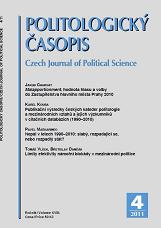Nepál v letech 1990–2010:slabý, rozpadající se, nebo rozpadlý stát?
Nepal Between 1990 and 2010: Weak, Failing, or Failed State?
Author(s): Pavel MaškarinecSubject(s): Politics / Political Sciences
Published by: Masarykova univerzita nakladatelství
Keywords: Nepal; South Asia; weak state; failing state; failed state; Third World; internal conflict
Summary/Abstract: This article presents an analysis of the civil war and subsequent developments in Nepal through the concept of the failed state. The aim of the article is to evaluate whether Nepal meets the criteria for being recognised as a failed state. In the first part, the conceptualization of the term failed state and its general definition are introduced. The second part of the article focuses on methodology. Finally, the main part of the article presents an analysis of Nepal through the concept of the failed state, following theoretical concepts developed by Robert I. Rotberg. The author’s conclusion is that contemporary Nepal should not be regarded as a failed state. Despite the chronic internal weakness of the country and its institutions, whose functions are in many cases carried out by parallel institutions, it is not possible to say that such functions were completely missing. Instead, we can say that the functions of these institutions and structures are limited – that is, that these institutions are performing their functions, albeit partially. In addition, the level of violence that occurs in some areas is not comparable with the period when Nepal was experiencing deep internal armed conflict.
Journal: Politologický časopis - Czech Journal of Political Science
- Issue Year: XVIII/2011
- Issue No: 4
- Page Range: 379-406
- Page Count: 28
- Language: Czech

